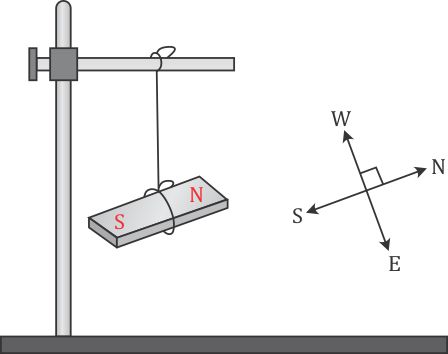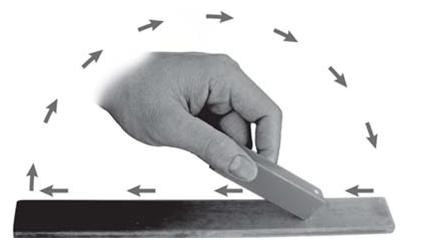Class 6 NCERT Solutions Science Chapter 10 - Fun with Magnets
Fun with Magnets Exercise 113
Solution 1
(i) Bar magnets, cylindrical magnets, U-shaped magnets
(ii) Magnetic materials
Concept insight: Only magnetic materials get attracted towards magnets.
(iii) Magnetic
Concept insight: Paper does not get attracted to a magnet so it is not a magnetic material.
(iv) Magnet
Concept insight: A freely suspended magnet always aligns in north- south direction.
(v) Two
Solution 2
(i) False
Concept insight: A magnet of any shape always has two poles.
(ii) False
Concept insight: Natural magnets were discovered in Greece.
(iii) True
Concept insight: Like poles repel each other and unlike poles attract each other.
(iv) False
Concept insight: Maximum number of iron fillings stick on the poles because the pull of a bar magnet is strongest at the poles.
(v) True
Concept insight: A freely suspended magnet always aligns itself in North-South direction.
(vi) True
Concept insight: The needle of a compass points towards the North-South direction. If the North-South direction is known, then East-West direction can also be determined. This direction is perpendicular to the North-South direction i.e., perpendicular to the compass needle in the same plane.
(vi) False
Concept insight: Rubber does not get attracted towards a magnet, so it is a non-magnetic material.
Solution 3
The pencil sharpener gets attracted towards the magnet because it contains a blade made of iron which is a magnetic substance.
Solution 4
| Column I | Column II |
| N - N | Repulsion |
| N - S | Attraction |
| S - N | Attraction |
| S - S | Repulsion |
Solution 5
Two properties of a magnet are:
1) Each magnet has two magnetic poles - North and South.
2) A freely suspended magnet always aligns in North-South direction.
Solution 6
Poles of a bar magnet are located at its two ends.
![]()
Solution 7
A freely suspended bar magnet always comes to rest in the North-South direction. The North facing end of the magnet is its North pole, and the South facing end is its South pole (as shown in the figure).

Thus, the unknown poles of a bar magnet can be marked by suspending it freely by a string.
Solution 8
Take an iron strip and keep one end of a bar magnet at one end of the iron strip. Without lifting the bar magnet, move it along the length of the iron strip till you reach the other end of the strip. Now lift the bar magnet and bring its same end again at the initial point. Move the bar magnet again along the whole length of iron strip in the same direction as done before. Repeat this process about 30 to 40 times. Then remove the bar magnet and bring some iron filings near the iron strip and check if it is converted to a magnet or not.
Solution 9
A compass consists of a magnetic needle with a dial marked with directions. The needle of the compass always comes to rest along the North-South direction. The compass is then rotated until painted end (North pole) of the needle is towards N (North) mark on the dial and the other end of needle is towards S (South) mark on the dial. We can now find any direction by looking at the dial of the compass.

Solution 10
|
Column I |
Column II |
|
Boat gets attracted towards the magnet. |
Boat is made of magnetic material.
|
|
Boat is not affected by the magnet.
|
Boat is made up of non-magnetic material. |
|
Boat moves towards the magnet if North pole of the magnet is brought near its head. |
Boat is fitted with a magnet with South pole towards its head.
|
|
Boat moves away from the magnet when North pole is brought near its head. |
Boat is fitted with a magnet with North pole towards its head. |
|
Boat floats without changing its direction. |
Boat has a small magnet fixed along its length. |
Concept insight:
Magnetic materials get attracted towards a magnet.
Non-magnetic materials do not get attracted towards a magnet.
Unlike poles attract each other.
Like poles repel each other.
A freely floating magnet always aligns itself in the North-South direction.


